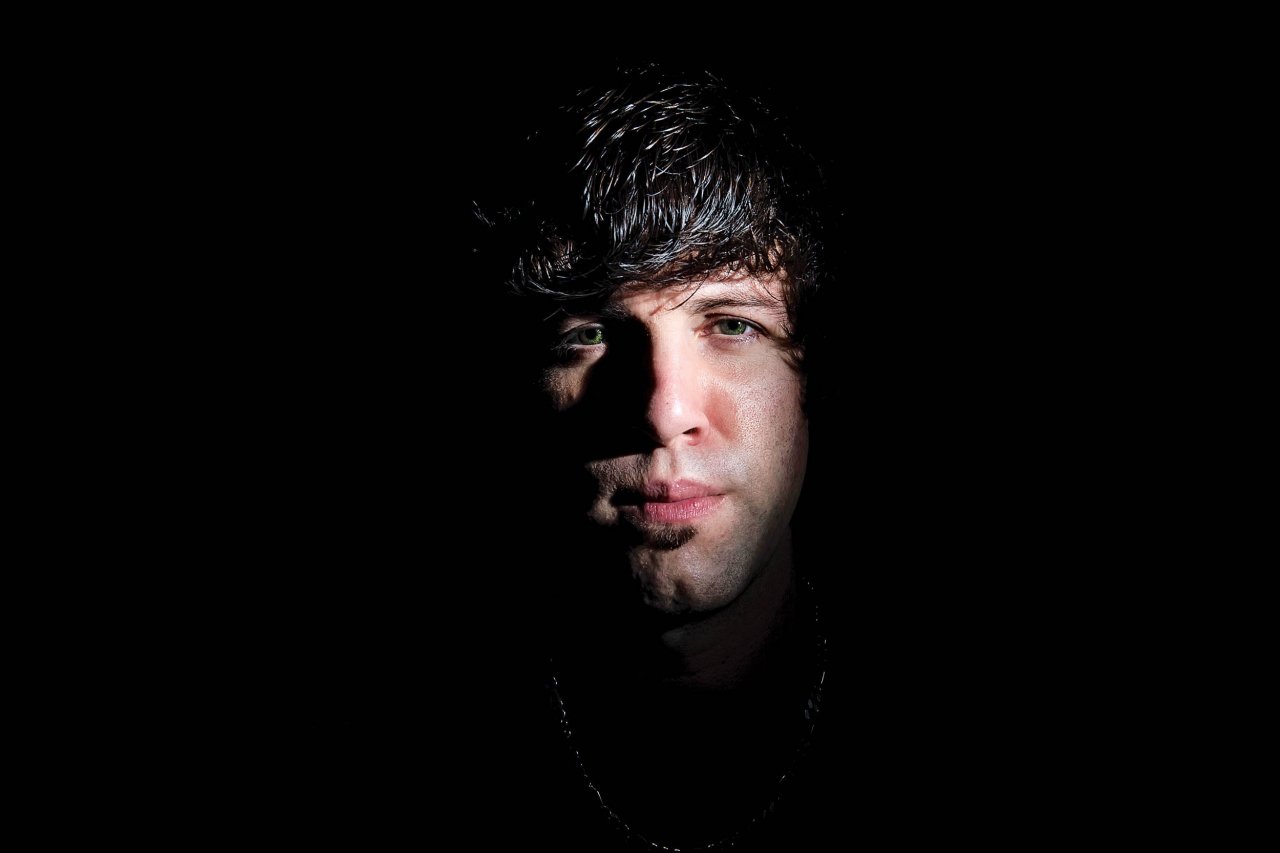Matthew DeHart woke up scared, disoriented and strapped to a gurney in the back of an ambulance. It was shortly after midnight, August 7, 2010. His heart was beating fast, and he was trembling. What had happened to him? Where was he going? His phone, keys and wallet were no longer in his pockets, and he was surrounded by strangers—the paramedics who'd arrived in the ambulance. And guards from a jail in Maine.
DeHart was rolled into an emergency room in Bangor, where a doctor made these notes: "26-year-old white male brought in in custody of Penobscot County Jail correctional officers.… Patient has multiple rambling complaints…restless and agitated, fairly tremulous as well as tachycardic. He reports [he is incarcerated] because Homeland Security is accusing him as well as several associates of his of espionage...hypomanic during examination.… He appears to be paranoid and delusional with an idea of the FBI monitoring him."
After doing a full run-up, the ER doctors concluded DeHart had suffered an acute psychotic break, "most consistent with drug-induced psychosis such as secondary to amphetamines, cocaine or other stimulants." But DeHart denied ever willingly taking drugs, and he had been in the custody of law enforcement for 16 hours before his trip to the hospital. No matter. The ER tended to DeHart for four hours and then handed him back to the guards, who shuttled him back to jail.
DeHart's apparently psychotic ramblings in that ER weren't delusional. He was being interrogated by the FBI, and those harrowing interrogations continued for almost a week. He wasn't allowed to make a phone call until August 12, six days after the FBI nabbed him. "He was basically babbling on the phone," his father, Paul, testified later in court. "It was apparent to me that he had been drugged in some way or another."
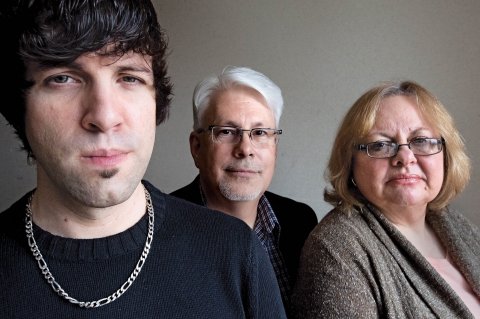
Matt DeHart says he was tortured for nearly a week by FBI agents chasing Anonymous, the hactivist collective, and WikiLeaks, the whistleblowing site. He says they forced him to take an IV with drugs in it, and later they bullied him into swallowing pills in order to get water to drink. (He says he later discovered the pills were chlorpromazine, a popular antipsychotic.) The FBI's declassified records verify that DeHart was questioned about his links to the hacktivist group and about running an online server that someone used to transmit classified documents, perhaps to WikiLeaks. The bureau denies he was forced to take the drugs that induced his psychotic breakdown.
While he was locked up in that Maine jail, DeHart was also indicted. But it was not for espionage or computer crimes, or anything he was grilled about over those six days of "enhanced interrogation" by the FBI. Instead, he was charged with soliciting and transporting child pornography.
This was yet another cruel, surreal twist for DeHart and his parents. The evidence cited in the child porn charge was two years old, they note, and DeHart hadn't been hiding out, so why had the FBI waited so long to arrest him? He had even applied for and received a new passport during that time.
DeHart's lawyer, Tor Ekeland, thinks he knows what game the feds are playing with his client. "With child porn, normally they'd arrest you right away, because it's a terrible thing," he says. "[But] he's not arrested on child porn; he's popped on an espionage alert. Then, they don't put him in front of a federal magistrate judge, which usually happens within five hours.… Next thing we know, he's in an ambulance going to the emergency room."
Ekeland, who has been working this case since the summer of 2014, is a frenetic, lanky New Yorker of Norwegian descent who can talk as fast as an auctioneer and specializes in the defense of people accused of computer crimes. He has filed several requests with the FBI for video recordings or transcripts of DeHart's week of interrogation. These requests have been denied. The FBI also denied Newsweek's request for documents or further comment on this case. The feds won't say why DeHart interests them, but he is pretty sure he knows why they are trying to bury him in a federal prison for 80 years. He thinks he accidentally saw something he wasn't supposed to see, something that would embarrass the FBI and the CIA, and expose a serious rift between the two law enforcement agencies regarding one of the most sensational and controversial crimes of the post-9/11 war on terror.
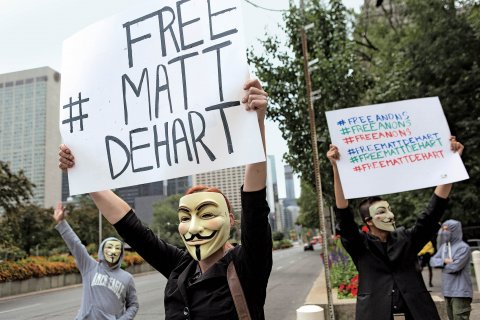
Going After Whistleblowers
DeHart may sound paranoid as he recounts this tale of persecution and prosecution, but major players in the world of leaks are rallying to his defense, even though they don't know what dark secret he's got on an encrypted thumb drive he's squirreled away somewhere. Jesselyn Radack was a Department of Justice lawyer who turned whistleblower during George W. Bush's first term in the White House. In 2002, she sent documents to former Newsweek writer Michael Isikoff disclosing ethical violations during the FBI's interrogation of John Walker Lindh, the so-called American Taliban. Today, she represents U.S. government whistleblowers, including Edward Snowden. "I don't represent DeHart. But I met with [his lawyer] and we talked about [his case], and I started digging. I thought: Wow, this is really a case that people should be paying attention to," she says. "This seems like such an odd case, but a lot of things that eventually become Espionage Act cases sound very strange when you first hear about them. This case certainly seems to have a backstory that involves possible future Espionage Act charges, which has been one of the government's favorite weapons in going after whistleblowers.
"The national security stuff is definitely the real issue here," she says. "They've tried to use child porn stuff against other clients of mine, who've been whistleblowers who were eventually charged and indicted under the Espionage Act." Child porn allegations, she explains, immediately "make you radioactive; it's a quick way to isolate you from everybody. People won't want to go near your case."
Is DeHart a whistleblower? When I ask him about that, he sounds cautious over a lousy connection on his jailhouse phone as he answers, "Potential whistleblower."

Any Excuse to Search
Nothing in DeHart's background points to him being a security risk. In fact, both his parents were members of the U.S. military—Paul was an Air Force captain and later worked for the National Security Agency (NSA), and Leann DeHart was a linguist, analyzing signals intelligence reports for the Army. Matt enlisted when he was 22, and became an all-source intelligence analyst with the National Guard at the Air Force base in Terre Haute, Indiana. One of his jobs was to look at footage collected by the drone pilots at his base.
DeHart was, by then, already a soldier online: a gnome mage carrying out raids on fantastical enemies. Online gaming had always seemed to help his attention deficit hyperactivity disorder, known as ADHD, and he ran a large World of Warcraft guild. Perhaps because of his family's interest in intelligence work, his WoW guild encouraged members to use good operational security—opsec—to connect to the game. He taught teammates how to log into and pay for the game without revealing their IP addresses, and how to chat securely over virtual private networks. "We were very secure," he tells me.
DeHart recruited for the guild on 4chan, the notorious image board where Anonymous was born. He soon became involved with Anonymous too, teaching opsec to some of its new members.
In June 2009, barely a year after he joined and shortly after he received "top secret" clearance, DeHart was honorably discharged from the military. "Once he had his security clearance, the unit cited depression as a reason to move for discharge," says his father—even though, he notes, Matt had been "allowed to enlist with both depression and ADHD known to his recruiters, with a waiver from his doctor. But the U.S. military has an alarmingly high number of suicides each year, particularly service members in drone units. We can only surmise that perhaps medical personnel at his unit were concerned that his depression might be more than sporadic. Better safe than sorry."
DeHart, however, thinks the Army was alarmed by his extracurricular work with Anonymous and wanted him cut off.
After his discharge, DeHart's interest in protecting online anonymity grew. He helped administer a Web server called the Shell with members of his WoW guild. The Shell was what is called a "Tor Hidden Service," a special Web address only accessible over the Tor anonymity network.
In September, while monitoring the server, DeHart found an unencrypted folder containing hundreds of documents, including one detailing what looked like an FBI investigation into some particularly shady deeds by the CIA. Only someone with a password to the Shell could have uploaded this file, so he knew immediately that it had come from someone connected to his WoW guild, his Anonymous groups or his military unit. He deleted the unencrypted folder from the server, but kept screenshots. He later saw an encrypted folder with the same name and of the same size on the server. He left this one alone. He believes this encrypted folder was headed for WikiLeaks, but he has no way of proving that.
It's nearly impossible to track the path any file takes to get to WikiLeaks, and the organization never comments on the origin of the stuff it posts. But DeHart's chats with his fellow gamers about the purpose of the Shell were clear: The site was not just for sharing files with one another. "We wanted to disclose the secrets of the U.S. government and to show what is really happening in our society," he told the German magazine Der Spiegel a few months ago.
It could be coincidence, but after that file of classified documents made its way through the Shell, DeHart says one of his friends got an unfriendly visit from the FBI. That pal tipped off DeHart, and he shut down the Shell and destroyed its hard drives with pliers on January 22, 2010.
Three days later, DeHart, who was living with his parents, was home alone playing an online war game when he heard a knock on the door. When he opened it, a dozen police officers rushed inside. He was presented with a warrant to search for evidence of possession of child pornography. During their execution of the warrant, police took everything they could find that could store digital data—computers, cellphones, even his Xbox and its controllers. Matt says the porn charges are completely groundless. He thinks the FBI just wanted an excuse to seize and search his electronics after the shutdown of the Shell. His lawyers point out that even though the FBI has held onto all these seized electronics for years, he has never been charged with possession of child porn: only solicitation and transportation.
The prosecution's full case against DeHart isn't public yet, and the Department of Justice lawyer assigned to it, Lynne Ingram, would not disclose any details about the government's version of events or supporting witnesses before the trial begins. But the indictment, filed in late 2014, charges that sometime "between in or about May 2008 and December 2008, in the Middle District of Tennessee and elsewhere, the defendant did knowingly and intentionally employ, use, persuade, induce, entice, and coerce a minor child under the age of 18...to engage in sexually explicit conduct for the purpose of producing any visual depiction of such conduct, which visual depiction was transported and transmitted using any mean or facility of interstate commerce."
In other words, the feds say DeHart got a minor to shoot a video of himself masturbating. The indictment doesn't say why DeHart did this, nor does it allege he ever possessed said video. The original indictment is based on the affidavit of a police detective who interviewed the boy.
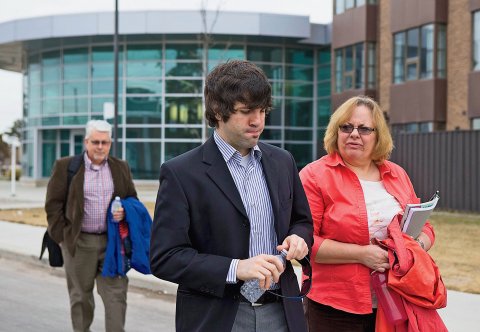
They TP-ed the Troll
During one of our jailhouse phone conversations, DeHart explained how he thinks the feds turned that boy and that story against him. In 2008, DeHart kicked a teenage boy who lives in Franklin, Tennessee, out of his WoW guild for getting on DeHart's nerves and being generally troll-y with him and other members. A guild acolyte, also a teenager, also in Franklin, then took the punishment of the troll offline and toilet-papered the boy's family home. This pissed off the troll's mother, who called the cops. DeHart says he thinks the boy must've said something about the online guild because police executed a search of the boy's computer. On the boy's computer and cellphone they found the child porn in question, that jerk-off selfie, as well as a similar selfie of a teenage female masturbating. These incriminating pieces of porn, however, were only ever found on that boy's devices. The boy's story, as told by Detective Brett Kniss in an affidavit, was that DeHart supposedly posed as a female, sent video of a girl as proof and solicited explicit videos.
But DeHart didn't know any of this backstory while he was sitting on his hands, watching the police tear up his parents' house, looking for hard drives and thumb drives. Instead, his thoughts that day were on the unencrypted file he'd seen on the Shell. The one he'd copied. He now felt scared and hunted, and when his parents got home, Matt told them about his activities with Anonymous and Tor. He didn't tell them about that file, which he had on USBs hidden in his dad's locked gun case.
DeHart's parents never believed he was involved in child porn. This faith was, they believe, confirmed by the fact that months after the exhaustive search of their home, he still hadn't been charged with a crime. But they agreed with DeHart that the feds were on his trail, so they decided the best plan was to help him start a new life. In a new country. In August 2010, they drove their son to Charlottetown, Prince Edward Island, and set him up with new furniture in a one-room apartment within walking distance of a college where he was going to study welding. It was a radical plan, but all three of them were relieved that DeHart could finally move on, far from the clutches of FBI.
Just before school started, DeHart had to cross the Maine border to activate his Canadian student visa. It was a minor inconvenience, a perfunctory back-and-forth, and he didn't plan to be in the U.S. for more than an hour. Instead, he fell off the grid for a week.
From Charlottetown, it was a long bus ride to the border town of St. Andrews, New Brunswick, so DeHart stayed at a motel the night before he was going to cross to the U.S. Early the next morning, he cheerfully taxied to the Calais, Maine, border and presented his passport. It was the passport scan that triggered an FBI espionage alert. He was detained, questioned and ended up in that emergency room, babbling to a doctor about torture and FBI plots.
When the FBI was through grilling him, he was transferred between federal facilities for weeks until he was finally tossed into the jail closest to the town where his child-porn accuser lived—Warren County Regional Jail in Bowling Green, Kentucky—to await trial.
He sat in that jail for 20 months as motions for extensions by both sides played out in court. Twice dates were set for a jury trial and then canceled, and throughout all these machinations, the Department of Justice prosecutor always pushed for DeHart's continued detention. The three judges who rejected bail always cited the seriousness of the charges. In May 2012, with no trial date set, he was finally released on bail by federal Judge Aleta Trauger, the first judge allowed to see the classified FBI reports on his 2010 interrogation. Trauger said in open court that the evidence being presented by the prosecution was "not as firm" as she had thought, and she understood why DeHart would think the porn case was a ruse to cover up the national security investigation. She mentioned that Detective Kniss couldn't prove DeHart was the person soliciting the intimate videos, and despite Kniss saying that DeHart had met the victim in person, the victim could not pick DeHart out of a lineup.
In April 2013, deeply concerned about their son's mental health and fed up with fighting charges they consider fabricated, the DeHarts drove 23 hours from Indiana to a remote Canadian border crossing, at International Falls, Minnesota. With Paul behind the wheel of their blue Chevy pickup, the DeHarts rolled up to the Canadian wicket and presented two passports, Paul and Leann's, and Matt's birth certificate and driver's license. Paul then informed the Canadian Border Services agent they were fleeing the U.S. and seeking asylum under the U.N. Convention Against Torture.
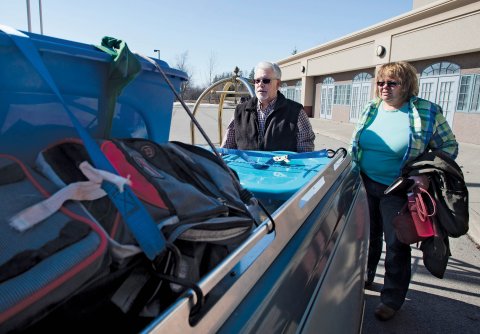
They were given an appointment to come back the next day, and stayed at a hotel on the Canadian side of the border. When they returned to the Canada Border Services office, Matt DeHart was taken into custody. He went to monthly detention hearings and was eventually released on bail, but had to continue to attend monthly hearings about the progress of the board's investigation into his asylum claim. While the Refugee Board considered the family's claim, DeHart was issued some of the strictest bail conditions an immigration applicant has received in Canadian history, including having to wear a GPS monitoring bracelet. In April 2014, during the Easter holiday weekend, the family's landlord asked them to move to make room for student tenants. Even though they managed to switch to another apartment in the same building, moving without notifying the court first violated DeHart's bail conditions, and he was sent to immigration detention to wait for the Refugee Board to issue a ruling on his asylum case. In February 2015, the board finally issued a 40-page legal decision denying asylum.
He was deported on March 1 and sent straight from that Canadian prison into FBI custody. He's now back in the Warren County jail, still awaiting trial, which is now scheduled for September 15.
"It's Kafkaesque; I can't even describe it," he told me in our last conversation before he was deported. "I just want it to be over.… It's a nightmare that doesn't end."
Whether the child porn charges are just a ruse to conceal the FBI's national security investigation is now up to a federal court in Tennessee to decide. On April 2, DeHart pleaded not guilty on all four counts in the indictment, including the charge for leaving the state while on bail. On May 11, he made his first court appearance since fleeing the country in 2013.
The Internet has become a key factor in his defense. While DeHart was in Canada, Ekeland routinely went on Anonymous online radio shows to discuss the case and keep the networks of online activists apprised of developments in his case. And the Courage Foundation, a nonprofit set up to support whistleblowers, took on DeHart as a beneficiary after he was deported, and now runs his website and defense fund. High-profile people like Radack, NSA whistleblower Thomas Drake and Julian Assange have also expressed support for the DeHarts in their efforts to find out what happened to their son and why he is still in jail.
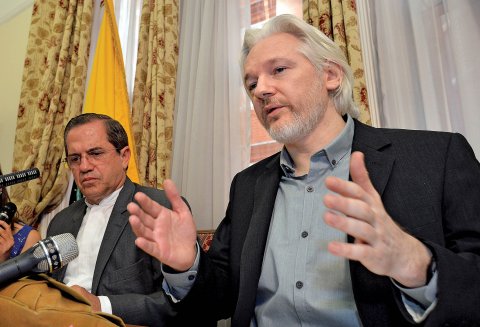
"The attention makes a huge difference," Ekeland says. "Before, nobody knew."
Anthrax-Laced Letters
Exactly one month after Canada deported DeHart, his parents left Canada too. They chose to leave on April Fools' Day, "for symbolic reasons." I drove from Toronto to the Buffalo, New York, border crossing to meet them just before they re-entered the United States.
At 8 a.m., we met for breakfast in a restaurant on the Canadian side. With her husband by her side, Leann DeHart told me her son had finally showed her that folder of documents in 2013, to convince her that they should seek asylum in Canada. He wanted her to understand the sort of trouble he was in. As Leann spoke, the tension in our booth was high. We had all turned our cellphones off, and I'm scanning the dining room for eavesdroppers. Leann says she saw what appeared to be many classified documents. One of them was field notes purporting to be from an FBI investigation of anthrax-laced letters that were sent to newsrooms and to two Democratic senators shortly after the 9/11 attack. These letters killed five people and sickened 17, and dominated the headlines for months. She is convinced those notes show the FBI looked into whether the CIA tried to frame jihadis for the anthrax attack and that the White House quashed that part of the investigation.
The DeHarts say they no longer have any copies of this file. One copy was confiscated by Canadian police when DeHart submitted it to support his asylum case, and was never returned. No one will say where that file is now. The Canadian Border Services Agency would only say that DeHart's "belongings" were handed over to U.S. law enforcement when he was deported. DeHart told some members of the Canadian press that he mailed another Shell file to a contact in the United Kingdom for safekeeping a few days after that raid on his parents' house.
Paul, sitting next to Leann in the booth, told me then he didn't see the file, but believes his wife and son.
After breakfast, I offered to drive across the border with the DeHarts so they'd have a witness if they were arrested, and they accepted. They peeled the "Free Matt DeHart" magnets off the doors of their battered blue pickup, and then they got into the cab and pulled out. I followed in my white Kia. Just a few minutes later, we caravanned past the Canadian duty free shop and lined up at the wicket to enter the U.S.

As the light turned green for their battered blue pick-up to inch forward to the gate, five or six armed agents converged from different directions in front of their vehicle. The agents stood in front of the DeHarts' vehicle while their paperwork was double-checked. I was on edge, ready to jump out of my car, but they were not detained. Instead, I was.
"What is your purpose for entering the United States?" said the man at the wicket.
"I'm a reporter," I told him, "writing about the couple you just let through, the DeHarts." He told me to pull off to the right and enter a building for passport control. I was instructed to leave all recording devices in the car and surrender my keys. As I stood by, watching, they rifled through every bag and compartment in the car. Forty-five minutes later, I was released.
I've crossed the U.S.-Canada border at least 100 times in the past 20 years, and this was the first time my car has been searched. I know that sounds paranoid. Maybe even a little crazy?
Bethany Horne now lives in Berlin and is writing a book about the influence of German hacker culture on modern cyberpeacekeeping.



